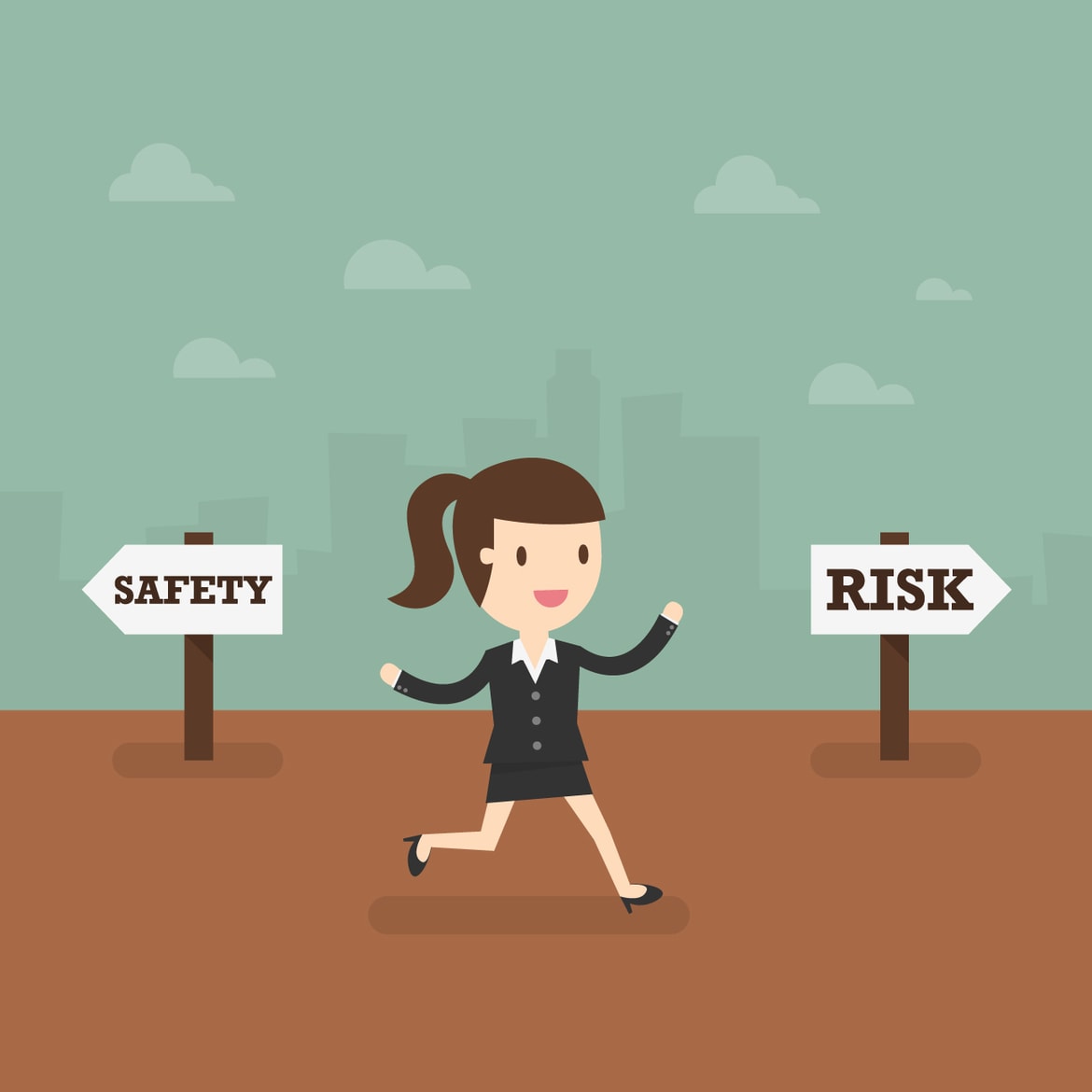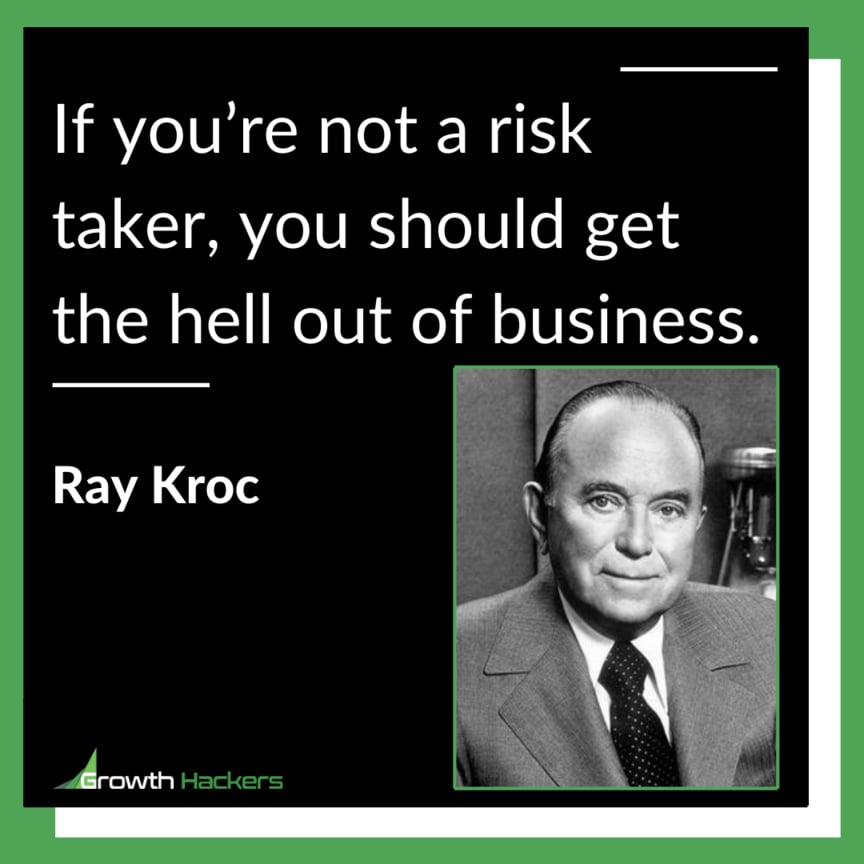If you’re looking for ways to evolve in business or marketing, calculated risk taking may be your answer. This process is essential for both entrepreneurs or business owners. You won’t be able to test the limits or challenge the status quo if you keep it safe.
Keep in mind it’s impossible to predict how your calculated risk will play out. As much as a decision could lead to future success, there’s also the potential for failure. There are necessary steps you can take to reduce uncertainty or cost. When you take time to master these steps, understand the benefits of risk, and see how others have done it, you’ll see that you should come up with one on your own.
Keep in mind it’s impossible to predict how your calculated risk will play out. As much as a decision could lead to future success, there’s also the potential for failure. There are necessary steps you can take to reduce uncertainty or cost. When you take time to master these steps, understand the benefits of risk, and see how others have done it, you’ll see that you should come up with one on your own.
What is Calculated Risk Taking?
Calculated risk taking is the difference between taking a calculated gamble and risking everything on an unknown. This can be seen as both good or bad, depending of how risky you want to get--and with all things considered there's no shame in playing it safe every once in awhile! Successful entrepreneurs have to be willing and able to take calculated risks. This doesn't happen in most established businesses, unless you're the CEO--and even then sometimes it's better not risk anything by playing it safe!
I've always been fascinated by the idea of risk in business. I find that calculating your risks is much more rewarding and fulfilling than playing it safe all day long -- there's no one-size fits all formula for success! I'm convinced this calculated risk taking attitude doesn’t just apply to entrepreneurs or CEOs; every successful career will not necessarily translate into being a wild and out of control journey.
A calculated risk is a risk that’s carefully planned out and based on thoughtful consideration for all potential costs and benefits. Calculated risk-takers plan out their goals and steps they’ll take to achieve them. Instead of rolling the dice, they find ways to alleviate risk so that their vision is in line with reality.
Keep in mind that every business decision comes with its own set of advantages and disadvantages. When you push your standards by taking a calculated risk, those factors dramatically increase. When you plan ahead, you can set up a strategy and plan that has more potential for success.
I've always been fascinated by the idea of risk in business. I find that calculating your risks is much more rewarding and fulfilling than playing it safe all day long -- there's no one-size fits all formula for success! I'm convinced this calculated risk taking attitude doesn’t just apply to entrepreneurs or CEOs; every successful career will not necessarily translate into being a wild and out of control journey.
A calculated risk is a risk that’s carefully planned out and based on thoughtful consideration for all potential costs and benefits. Calculated risk-takers plan out their goals and steps they’ll take to achieve them. Instead of rolling the dice, they find ways to alleviate risk so that their vision is in line with reality.
Keep in mind that every business decision comes with its own set of advantages and disadvantages. When you push your standards by taking a calculated risk, those factors dramatically increase. When you plan ahead, you can set up a strategy and plan that has more potential for success.
Steps to Taking Calculated Risks
Do your Due Diligence
A decision shouldn’t be based on emotions. Instead, justify your ideas on logic and evaluate every detail. Break down your decision into smaller decisions so you don’t feel overwhelmed with every possibility. Those smaller decisions are independent risks that lead to your overall goal. Instead, analyze all possible routes and find out which path is most efficient.You can’t afford to scan over details you think are minor. One helpful tip is to ask advice from a trusted advisor. Invest time by going over all of the numbers so you’re not scrambling last minute to undo any mistakes.
Anticipate Mistakes
Entrepreneurs are not inherent risk takers, but rather calculated risk takers, As you consult a trusted advisor, the two of you can point out any red flags or potential issues before they surface. Some excellent probing questions to ask include:● If a deal loses money, how will the business respond?
● If a partnership breaks down, what course of action will you take?
● If a project falls behind, how will you meet the deadline?
Seek balance. Can your bottom line afford to take any hits if the opportunity you sought out starts to fail? If you’re dialed in and keep track with the numbers that go into your calculated risk, you’ll be able to assess the effectiveness of your strategy.
You should not calculate risk based on your level of fear. Instead, it's essential to assess the actual level of risk by examining all available facts and then make an informed decision about whether or not that particular step you're going to take is worth taking for you and your business!
It’s also a good idea to consult a mentor. Introduce them to your idea and plan of action so that they can point out any flaws or mistakes that they may have made in the past. Years of failure on their end can save you valuable time on your journey to success.

Set Checkpoints
After you take the time and energy to collect all of the valuable information you need, it’s time to create a road map. Construct a well-built plan of action along with a list of possible outcomes. Don’t take shortcuts so you’ll be able to weigh how your risk will pan out.While you may be planning ahead months or years in advanced from your desired outcome, regular checkpoints will keep you focused to stay the course.
It's crucial to be able think on your feet. You can't plan for every possible outcome. A risk assessment is an essential part of any good business. A successful company must have a plan that ensures its success in the long-term, which includes assessing risks and potential outcomes for these events to see how they will play out on your end goals--both now or later down the line when planning becomes more difficult without knowing what may happen next!
Jump When it Feels Right
You don't want to avoid any risks, what you want is mitigate risk. There are always potential risks when you want to move forward. But, it's even a higher risk to stand still. Don’t ignore your research and data. You have to rely on them because they’ll point out when the right opportunity to take the plunge arises.That being said, it’s okay to say “no.” Not every idea should be pursued, that’s why you must emphasize the importance of laying down the groundwork and the steps you’ll take. It’s difficult to pursue an unexpected or shocking opportunity if your plate is already full.
For example, when Facebook offered $500 million to overtake the growing Twitter platform in 2008, the company rejected it. Jack Dorsey and his team believed in its original vision.
Be Ready to Pivot
Sometimes you have to revise your well-planned strategy. A budget may get cut and a partnership can fall through. Your strategy is good if it gives you flexibility to change the course and keep a forward-thinking mindset.Let’s say that you're chasing a new venture with a $50,000 budget. Two months into the four-month-long project you find out your budget is being cut by $10,000. What do you do? With a flexible plan, you can head back to the drawing board and assemble a creative solution.

Benefits of Calculated Risk Taking
By taking calculated risks and not going "All In" on all your ideas, entrepreneurs will stop sabotaging their business growth. Nothing special happens to people who are too predictable and don’t innovate. A calculated risk pushes you out of the ordinary. Even if your plan turns into a huge flop, you’ll grow from your willingness to try something new. It’s not time wasted, it’s a way for you to learn how to improve next time.
Competitive Edge
The demands in your market are always changing. As they do, your customers' deep desires and needs will evolve. They need something new. If you’re the person who has the guts to deliver that to them, you’ll be rewarded. Not only will these customers remember your product, but they’ll spread referrals for you giving you a robust business.Transform the Market
Being average and playing to the status quo won’t cut it in today’s world. To stay ahead of the competition, you’ll need to come up with ideas and do the things others aren’t willing to.Crush your Fear of Failure
After you take the plunge and find out your risk made you successful, you’ll be open to more possibilities. What else are you capable of? If you can break through the illusion of your limits, how else can you improve?Learn to Rely On Others and Trust More
As you eliminate your fears, you’ll learn to respect and trust the process that took you there. Your team and your close business partners are there for you to consult with if you need an extra boost of confidence.
Characteristics of a Risk Taker
The characteristics of a risk taker are:
1. Optimistic about the possibilities – Optimism doesn’t just make you feel better, but more confident. As a leader or entrepreneur, having confidence in your decisions is key, especially when you have others following you.
2. Comfortable taking chances – They know how to step outside their comfort zone. Whether you’re pursuing a new business partnership or creating a new product that’s outside your wheelhouse, taking a risk is where growth happens. The more you take chances, the more comfortable you’ll become.
3. Agile and able to adapt – When there’s ambiguity, it’s necessary to take the measures to prepare yourself for any possible outcome. Be able to adapt and pivot if a new business venture or campaign doesn’t go as planned.
4. Focused on execution – Just as important as planning and preparation is the execution of an idea or project. Have a team in place to support you. A strong team can create the desired plan of action and create a plan B if your plan doesn’t go accordingly.
These characteristics don’t always come naturally and can be learned through experience. Consider finding a mentor in your industry who can coach you and provide guidance along the way. Someone with 20+ years of experience in the field will have been through situations that maybe you haven’t. A mentor can provide insight into mistakes they may have made.
Decision making is often a very difficult process that requires careful consideration and understanding. Don't do it alone! When it comes to making decisions, people's brains are like computers; when there is too much data and information for them to process on their own they need help from someone else.
Every entrepreneur, small business owner or startup founder has a certain level of risk tolerance; some quite high, some quite low depending on their past experiences, education and background. But, it's important to know that pretty much any decision that you take in the business world has some kind of risk attached to it. There's calculated risk taking but no decisions "free of risk".
1. Optimistic about the possibilities – Optimism doesn’t just make you feel better, but more confident. As a leader or entrepreneur, having confidence in your decisions is key, especially when you have others following you.
2. Comfortable taking chances – They know how to step outside their comfort zone. Whether you’re pursuing a new business partnership or creating a new product that’s outside your wheelhouse, taking a risk is where growth happens. The more you take chances, the more comfortable you’ll become.
3. Agile and able to adapt – When there’s ambiguity, it’s necessary to take the measures to prepare yourself for any possible outcome. Be able to adapt and pivot if a new business venture or campaign doesn’t go as planned.
4. Focused on execution – Just as important as planning and preparation is the execution of an idea or project. Have a team in place to support you. A strong team can create the desired plan of action and create a plan B if your plan doesn’t go accordingly.
These characteristics don’t always come naturally and can be learned through experience. Consider finding a mentor in your industry who can coach you and provide guidance along the way. Someone with 20+ years of experience in the field will have been through situations that maybe you haven’t. A mentor can provide insight into mistakes they may have made.
Decision making is often a very difficult process that requires careful consideration and understanding. Don't do it alone! When it comes to making decisions, people's brains are like computers; when there is too much data and information for them to process on their own they need help from someone else.
Every entrepreneur, small business owner or startup founder has a certain level of risk tolerance; some quite high, some quite low depending on their past experiences, education and background. But, it's important to know that pretty much any decision that you take in the business world has some kind of risk attached to it. There's calculated risk taking but no decisions "free of risk".

Successful Company Examples
Every successful business leader has taken chances, but few are as cautious and risk averse as they should be. The people who thrive in this field know how important it is to have both an appropriate level of caution while also being prepared for opportunities that may come along at any time. Merely waiting around until everything goes right isn't going help you succeed--you need some adventurousness if you want to make something happen!
The successful companies we know and love sometimes don’t have an easy start. Let’s take a look at some company examples where the founders took a risk to try something new.
Whole Foods: The co-founders of Whole Foods took a calculated risk to leave their already successful grocery store business in the 70s to invest in a market based around natural foods. They did this at a time when organic and all-natural foods were considered taboo.
Pinterest: After their failure to launch across a mass market in 2010, the founders and programmers of Pinterest continued to develop the site out of a small apartment until it took off in the summer of 2011. Now the dynamic social media web and mobile app has over 250 million active users along with over 800 employees.
Charmin: In 2014, Charmin opted to use humor as a way to engage with its audience. They continue to join marketing success with their style to address an awkward subject.
Risks are a part of business, but it is important to weigh the risks and rewards before you take them. Entrepreneurs or small business owners who become risk averse often do so because they have had negative experiences with calculated or foolish decisions that ended badly in their past ventures.
The successful companies we know and love sometimes don’t have an easy start. Let’s take a look at some company examples where the founders took a risk to try something new.
Whole Foods: The co-founders of Whole Foods took a calculated risk to leave their already successful grocery store business in the 70s to invest in a market based around natural foods. They did this at a time when organic and all-natural foods were considered taboo.
Pinterest: After their failure to launch across a mass market in 2010, the founders and programmers of Pinterest continued to develop the site out of a small apartment until it took off in the summer of 2011. Now the dynamic social media web and mobile app has over 250 million active users along with over 800 employees.
Charmin: In 2014, Charmin opted to use humor as a way to engage with its audience. They continue to join marketing success with their style to address an awkward subject.
Risks are a part of business, but it is important to weigh the risks and rewards before you take them. Entrepreneurs or small business owners who become risk averse often do so because they have had negative experiences with calculated or foolish decisions that ended badly in their past ventures.

Final Thoughts about Calculated Risk Taking - Taking Calculated Risks as an Entrepreneur
Successful entrepreneurs take risks that are often calculated, not a pure gamble based on nothing. A successful entrepreneur often knows when a risk is worth taking. A calculated risk requires a significant amount of time, energy and courage. Your decisions carry a lot of weight to the success of your business. If you work on a strategic plan to execute your calculated risk, you open up the doors to true innovation and growth for your business.Master these steps, the benefits of each and one day your business could be featured on the list of innovators who overcame the odds. For more on this topic, Valpak created a helpful infographic on how to take calculated risks
Growth Hackers is definitely one of the best growth hacking agencies helping entrepreneurs, founders, business people and marketers succeed online. First, we evaluate their aspirations, visions and goals. We help them build their online brand by telling their stories while creating educational content done for their target audience. If they have a product or a service, we help them promote it. When you're an entrepreneur or a business owner, you have to take risks. But, you don't need to take crazy risks but rather take calculated risks. Taking calculated risks is a great way and sure way to succeed. At Growth Hackers, we can help you do just that. So, contact us at Growth Hackers now if you want your entrepreneur journey to be a success.




